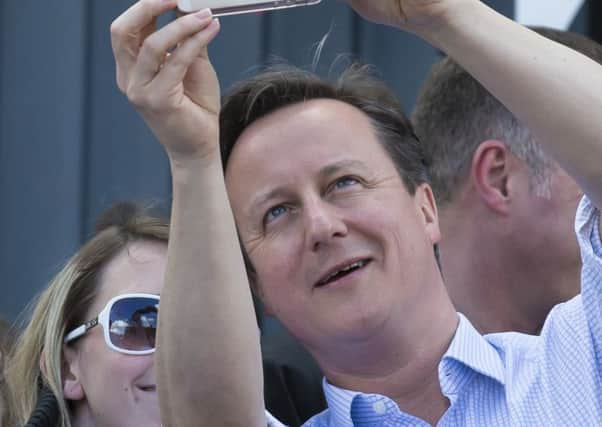Leaders: Scepticism feeds electoral gimmicks


That is the reason behind two particularly extraordinary pronouncements in the past week. The first, from Conservative leader David Cameron, is that a Tory administration would pass a law “within a hundred days” to block any upward changes to income tax, national insurance and VAT.
Clearly he feels that the party’s manifesto pledges are not enough; that the sanction of the law is now required. Even assuming such a law would ever get through both houses at Westminster, this proposal immediately casts doubt on all the other Tory manifesto pledges: how credible are these now without similar commitment to legal enforcement?
Advertisement
Hide AdAdvertisement
Hide AdNow comes an extraordinary proposal from Labour leader Ed Miliband to erect an eight-foot-high stone monument with his key manifesto pledges chiselled upon it, this to be installed in the back garden of 10 Downing Street if he wins the election.
The proposal has immediately been branded “Miliband’s Moses Moment” and sparked uproar on social media over what must rank as one of the most fatuous gimmicks in this campaign. All it requires now is for a bandy-legged Liberal Democrat leader Nick Clegg to appear with four concrete millstones round his neck proclaiming his “red lines” for those mooted coalition negotiations.
Now an element of absurdity can always be counted on in general election politics.
But the problem with these two examples – and there may yet be more with four days still to go – is that they attach, not to some wayward candidate who has lost the script, but to the two main party leaders. And they threaten to turn the final days of the election into a grotesque Roman circus.
The immediate challenge to manifesto credibility is, of course, the likelihood of intense horse trading if the result on Thursday is indeed a hung parliament and the major players are plunged into immediate talks to form an administration that can command the Commons. Here Mr Miliband’s earnest protestations – presumably not inscribed on the monolith – that he will not enter an arrangement with the SNP has served both to buttress support for the SNP while stretching the credibility of Labour supporters in the rest of the UK.
It would greatly help voters – and indeed, the credibility of all parties – were the final days of the election campaign to be free of any more such desperate gimmicks.
Name game could see a coalition
IF THE phones were not already ringing off the hook at bookies’ offices to place a bet on the election outcome, the calls have multiplied over the weekend – this time on the name the Duke and Duchess of Cambridge will choose for their daughter.
Were it purely a Scottish matter, there’s no doubt of the winning name: “Nicola” would be top of the list. But for reasons too complex to go into here, this may be unlikely.
Advertisement
Hide AdAdvertisement
Hide AdFor similar reasons, the names “Samantha”, “Leanne” and “Natalie”, for all their charms, may not figure on the final selection list. Charlotte and Alice are still thought to be front runners but Kensington Palace confirmed that the name would not be announced until at least today. Victoria, Olivia, Elizabeth and Diana are also popular choices.
Bookmaker William Hill said its takings on baby name bets had hit six figures.
Given the febrile UK general election campaign, every care will be taken to ensure that the name will have no political connotation.
But at the same time, it is extremely unlikely that one name on its own will secure an overall majority at Kensington Palace.
In line with long Royal tradition, William and Kate will almost certainly opt for a two-party “baby name coalition” – Victoria Elizabeth, for example, or Charlotte Diana.
Better still would be a grand “three name coalition” – Katherine Margaret Demelza.
And a knock-out four-barrel name should not be ruled out for the fourth in line to the throne: surely Victoria Charlotte Elizabeth Chardonnay would sweep the country – and leave only the bookies in misery.